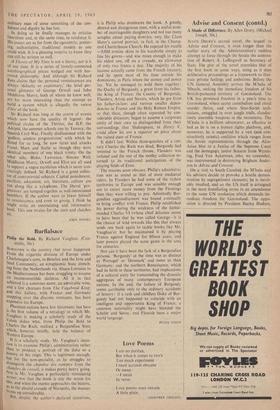Burflaisace
Philip the Bold. By Richard Vaughan. (Con- stable, 30s.)
BURGUNDY is the country that never happened. From the tripartite division of Europe under Charlemagne's sons, to Benelux and the Iron and Steel Community, an ectoplasmic State stretch- ing from the Netherlands via Alsace-Lorraine to the Mediterranean has been struggling to assume an incontrovertible skeleton. All it in fact achieved is a sonorous name, an admirable wine, and a few choruses from The Vagabond King; and this failure, with France and Germany snapping over the discrete remnants, has been expensive for Europe.
• Phantom nations have few historians; but here is the first volume of a tetralogy in which Mr. Vaughan is making a scholarly study of the Valois dukes who, from Philip the Bold to Charles the Rash, realised a Burgundian State which, however briefly, held the balance of Western Europe. It is a scholarly study. Mr. Vaughan's inten- tion is to examine Philip's administration rather than to produce a portrait of the duke or a history of his reign. This is legitimate enough; out for the non-specialist, as he struggles to distinguish the chambre des comptes from the ,,,chanthre de coined, it makes pretty heavy going, 'Or is Mr. Vaughan a particularly stimulating writer; not that the book is any the worse for this, and when the matter approaches the bizarre, livens in the absurd crusade of Nicopolis, the manner livens up considerably.
But, despite the author's declared intentions,
it is Philip who dominates the book. A greedy, shrewd and disingenous man, with a useful nunn- ber of marriageable daughters and not too many scruples about paying dowries; very like Claus Sluter's carved portrait, in fact, in the Champ- mol Charterhouse Church. He enjoyed his wealth —9,000 ermine skins in his wardrobe simply CO line his gowns—and was mean enough to make his eldest son, off on a crusade, an allowance of only two francs a day. The majority of his income actually came from the French treasury, and he spent most of his time outside his dominions, in Paris where the money and power lay. Yet he managed to weld them together: the Duchy of Burgundy, a grant from his father, the King of France; the County of Burgundy, Flanders, Artois and Nevers, which he got from his father-in-law; and various smaller depen- dencies in France and the Holy Roman Empire, so that these, though often separated by con- siderable distances, began to assume a corporate entity of their own so distinguished from their surroundings that Shakespeare, in Henry V, could allow his son a superior set piece about the ruined state of France.
It didn't last. Within three-quarters of a cen- tury Charles the Rash was dead, Burgundy had reverted to the French throne, Flanders was isolated and the rest of the motley collection re- turned to its traditional anticipation of the playing fields of Eton.
The reasons seem obscure. Philip's administra- tion was as sound as that of most mediawal rulers. In Flanders he had some of the richest territories in Europe and was sensible enough not to extort more money from the Flemings than they were willing to pay. Admittedly Bur- gundian aggrandisement was bound eventually to bring conflict with France. Philip established his power during the weakness of the feeble- minded Charles VI (whose chief delusion seems to have been that he was called George—it is the chance of wild rewards like this that always sends one back again to tackle books; like Mr. Vaughan's); but he maintained it by playing France against England for fifteen years, and later powers played the same game in the area for centuries.
Nor can it have been the lack of a Burgundian persona. 'Burgundy' at the time was as distinct as 'Portugal' or 'Denmark' and more so than Germany; and the northern Renaissance, which had its birth in these territories, had implications of a cultural unity far transcending the dynastic aggregates of many contemporary European nations. In the end, the failure of Burgundy seems ascribable only to the ordinary accidents of history: if a rash and childless Duke of Bur- gundy had not happened to coincide with an intelligent and opportunist King of France, a common nationality might have blended the Scheldt and Savoy, and Flemish been a major world language.
PETER F1SON


































 Previous page
Previous page